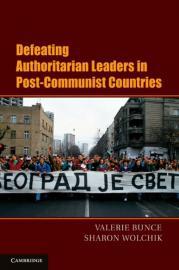-

权力与社会
现代政治学大家的代表作之一。本书共分三个部分,分别对人、观点、团体、影响力、权力、符号、实践、职能、结构、过程进行了分析。 -

Media, Social Mobilisation and Mass Protests in Post-colonial Hong Kong
Since 2003, Hong Kong has witnessed a series of large-scale protests which have constituted the core of a reinvigorated pro-democracy movement. What drove tens of thousands of citizens to the street on a yearly basis to protest? What were the social and organizational bases of the protest movement? How did media and public discourses affect the protests’ formation and mobilization? How did the protesters understand their own actions and the political environment? This book tackles such questions by using a wide range of methods, including population and protest onsite surveys, media content analysis, and in-depth interviews with activists, politicians, and protest participants. It provides an account of the "self-mobilization processes" behind the historic July 1, 2003 protest, and how the protest kick-started new political dynamics and discursive contestations in the public arena which not only turned a single protest into a series of collective actions constituting a movement, but also continually shaped the movement’s characteristics and influence. The book is highly pertinent to readers interested in political development in Hong Kong, and as a case study on "the power of critical events," the book also has broad implications on the study of both media politics and social movements in general. -

當代中國的自由民權運動
中國的改革開放使得原來被國家完全控制的社會開始鬆動,公民社會已經出現。中國的市民社會在維護自己權益和爭取自由的目的之下,在最近幾年內發展很快,一個重要的標誌就是出現了知識分子、農民、城市弱勢群體、中產階層和宗教自由的社會運動。這些社會運動雖然剛剛出現,還是自發形態的,但力量之大、勢頭之猛,以及前仆後繼的勇氣,帶來了中國社會巨大的變化。在互聯網和維權律師兩個支持平臺的幫助之下,社會在許多地方開始和國家之間展開了鬥爭,並在多個方面取得了勝利。在和國家的衝突之中,社會已經迅速地組織起來。這些已經迫使國家開始調整政策。從當前發展狀況來看,在強大的市民社會的壓力下,一個可以有效制衡國家、迫使國家進行政治改革的狀態很有可能出現。 -

Defeating Authoritarian Leaders in Postcommunist Countries
Why would authoritarian leaders ever lose elections? Valerie J. Bunce and Sharon L. Wolchik answer this question by analyzing a remarkable run of electoral victories by the opposition in postcommunist Europe and Eurasia from 1998 to 2005. They conclude that these upset elections occurred because of the hard and creative work of a transnational network that was committed to electoral change and composed of local opposition and civil society groups, members of the international democracy assistance community, and graduates of successful electoral challenges to authoritarian rule in other countries. -

Insurgent Identities
Product Description In this important contribution both to the study of social protest and to French social history, Roger Gould breaks with previous accounts that portray the Paris Commune of 1871 as a continuation of the class struggles of the 1848 Revolution. Focusing on the collective identities framing conflict during these two upheavals and in the intervening period, Gould reveals that while class played a pivotal role in 1848, it was neighborhood solidarity that was the decisive organizing force in 1871. The difference was due to Baron Haussmann's massive urban renovation projects between 1852 and 1868, which dispersed workers from Paris's center to newly annexed districts on the outskirts of the city. In these areas, residence rather than occupation structured social relations. Drawing on evidence from trail documents, marriage records, reports of police spies, and the popular press, Gould demonstrates that this fundamental rearrangement in the patterns of social life made possible a neighborhood insurgent movement; whereas the insurgents of 1848 fought and died in defense of their status as workers, those in 1871 did so as members of a besieged urban community. A valuable resource for historians and scholars of social movements, this work shows that collective identities vary with political circumstances but are nevertheless constrained by social networks. Gould extends this argument to make sense of other protest movements and to offer predictions about the dimensions of future social conflict. -

Understanding Ethnic Violence
This 2002 book seeks to identify the motivations of individual perpetrators of ethnic violence. The work develops four models, labeled Fear, Hatred, Resentment, and Rage, gleaned from existing social science literatures. The empirical chapters apply these four models to important events of ethnic conflict in Eastern Europe, from the 1905 Russian Revolution to the collapse of Yugoslavia in the 1990s. Each historical chapter generates questions about the timing and target of ethnic violence. The four models are then applied to the case, to learn which does the best job in explaining the observed patterns of ethnic conflict. The findings challenge conventional wisdom, in that the Resentment narrative, centered on a sense of unjust group status, provides the best fit for a variety of cases. While Fear, Hatred, and Rage do motivate hostile actions, Resentment pervasively appears to inflame ethnic animosity and drive outcomes in the timing and pattern of action.